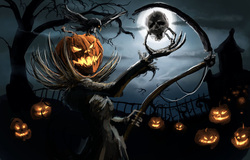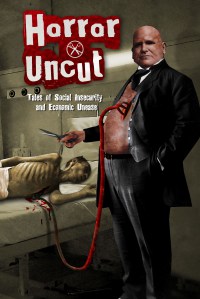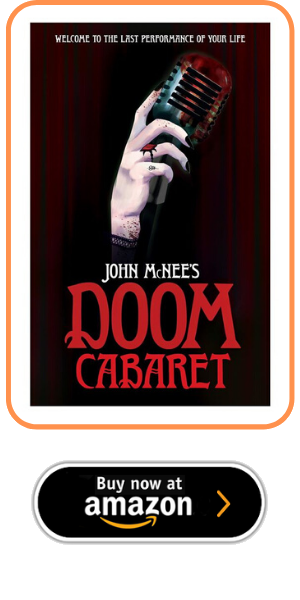 Okay, today being the day it is (and if you don't know, who are you and why are you browsing a horror website??), I'm going to take a quick run through the films that I, personally, consider to be the scariest, the most effective and the downright creepiest that I have ever seen (of course, this obviously excludes those films I haven't seen). This will be my personal interpretation. I'm not making claims for these films as being the 'best', or even particularly well scripted/financed/acted (although I think these things also play a part). I'm simply going to run through a number of films I found particularly effective in making my skin crawl; films that have stayed with me long after I've slotted the DVD/Blu-ray back on the shelf (feel free to disagree with my choices, but there is no wrong and right in this – only opinion). Horror is, like many other things, a highly subjective area – what works for one may well not work for another (and, in fact, I have experienced this first hand and on both sides). Ultimately, it all depends on the watcher's (or reader's) experience, outlook, tastes, temperament and a myriad of other factors. Having said that, I'm coming to the realisation that much of what makes horror work (and forgive me if this is widely known, I'm a mere novice) is where it breaks down the control, or the illusion of control that we, as a society or individual, hold. It's contact not only with the unknown, but the 'un-knowable'; the chaotic; the unfathomable. It's the breakdown of those polite and fragile rules and conventions we adhere to, that give our lives meaning and structure. It's when someone or something, some event, tears through the thin fabric of rationality and takes away any sense of self-determination we have. That's my view, anyway. It's why Alien is a horror film; why pretty much any serial killer film, including The Silence of The Lambs, is; why the extermination of the Jewish people in Nazi Germany is utter, abject horror (this is the most horrific thing to me; I can't watch a documentary about the concentration camps without crying). It's events we find difficult, if not impossible, to fathom and which have laid waste to our conceptions of polite (or even impolite) society. It's also why I think the work of H. P. Lovecraft endures, despite criticisms (most justified) of his personal politics and writing style. He tapped into that sense of the unknown better than most, that notion that behind the frail curtain of 'reality' lies nothing but chaos and madness. Anyway... Without further ado and in no particular order, here are my films... Kairo (Pulse) – (2001) – Dir: Kiyoshi Kurosawa – Language: Japanese (Japan).  Of the many, many Asian films I love (horror and otherwise), Kairo is quite possibly the most effective I've yet seen. It has all the elements that have become almost standard in these films (almost clichéd, one might say) – ghostly females with long, unkempt black hair; ancient/traditional curses manifesting themselves through modern technology; evil or the supernatural almost as a viral epidemic – but what Kairo manages to do that most others don't is tap into that chaotic, unnameable atmosphere that goes beyond the plight of the individual and is about society as a whole descending into the fearful unknown. To be honest, I have little to no idea what the hell is going on in this film. I know that the supernatural are manifesting themselves through technology (specifically, the internet); that there is some urban legend concerning a 'red-taped door'; that people are disappearing, or killing themselves. To be honest, I think the confusion (and I might have just been ultra-thick whilst watching) adds to the terror. Both scenes which feature images of spectres advancing at the camera and show virtually nothing at all, can send shivers up and down the spine. It's a wonderful slow burn of a film and really creeps inside the mind. COMPETITION TIME! WIN A COPY OF DEBUG
23/10/2014
 Everyone loves a competition, and thanks to to good people at Signature Entertainment Ginger Nuts of Horror has three copies to give away to three lucky winners. DEBUG comes to Blu-ray, DVD and digital platforms from November 3rd, 2014 courtesy ofSignature Entertainment. Sent in to deep space as punishment for computer-based crimes, six young hackers are attempting to debug the computer systems of a massive derelict space freighter. While they struggle to clear out the viruses, the team fall prey to the ship’s vengeful artificial intelligence, a programme that would literally kill to be human. As the fractious team is forced to match wits with this rogue programme, they discover that the ship holds a deadly secret – and a fate far worse than death. Written and directed by the multi-talented David Hewlitt (Rise of the Planet of the Apes, Cube) and starring Game Of Thrones’ Jason Momoa, DEBUG is a nerve-shredding sci-fi horror that proves that, in space, it doesn’t matter if they can hear you scream… TO WIN A COPY JUST ANSWER THIS SIMPLE QUESTION HOW MANY SIDES DOES A CUBE HAVE? EMAIL YOUR ANSWERS HERE GUEST POST - THE BEST APOCALYPTIC FILMS
18/10/2014
 Over the years apocalyptic films have come in all shapes, sizes and genres. Starting with the 1950s science-fictions, and moving into the epic and overwhelmingly patriotic and Americanised apocalypses of the 1990s, contemporary apocalyptic movies are now in the fashion of combing stories about the end of the world with dark comedy. The latest apocalyptic film, Open Grave, comes to DVD this October embedded deeply into the genre of horror. Starring Sharlto Copley in a chillingly scary and gruesome role, Open Grave proves to be a VERY different apocalypse to any we have seen before. Here we look back at the very best apocalyptic movies. SHARLTO COPLEY CAREER RETROSPECTIVE
18/10/2014
 SHARLTO COPLEY SHARLTO COPLEY To mark the start of a new series of film reviews on Ginger Nuts of Horror, which starts with a review of Open Grave here is a career retrospective of the films star Sharlto Copley. Sharlto Copley exploded onto the scene out of nowhere in 2009 in his powerful portrayal of Wilkus van der Merwe in District 9. Since then, the South African actor has gone from strength to strength, appearing alongside the likes of Matt Damon, Angelina Jolie, Liam Neeson and Bradley Cooper in emotionally intense, nefarious and hilarious roles. On 13th October Copley leads in the haunting horror chiller Open Grave, available on DVD and digital download courtesy of Signature Entertainment. Here’s how his career panned out... HORROR UNCUT: Tales of Social Insecurity and Economic Unease, edited by Joel Lane and Tom Johnstone (Gray Friar Press). HORROR UNCUT HORROR UNCUT This anthology arose out of the editors' horror at the austerity measures the Con Dem government has imposed. The stories in it represent an imaginative response to these hard times, by acclaimed writers of weird fiction, such as Alison Littlewood, Gary McMahon, Thana Niveau, David Williamson, Anna Taborska, John Llewellyn Probert, and Laura Mauro. Some stories deal with the immediate effect of the crisis on the housing market and the effect this has had on people in the construction industry. Other stories focus more on the instability of the financial markets, but in very different ways. Not all of the tales are specific to the recession though. Many of them tackle the austerity measures that have arisen apparently in response to the banking crisis, though I’d argue that ‘neo-liberal’ politicians, particularly the Conservatives, saw the situation as an opportunity to further their political and economic objectives: now that the immediate threat of economic meltdown seems to have faded (for now!), privatisation and cuts to services continue unabated, if anything intensifying as the Tory Right becomes more and more assertive. The fiction in the book explores these themes through characters we can all relate to. Stephen Bacon’s haunting tale shows the rapid change in the economic and social landscape, with long-established household names like Woolworths vanishing almost overnight, through the eyes of a young man just released from prison, with his own demons to face… Some tales use a satirical approach to mock the government’s propaganda about their cuts being all about ‘fairness’ to ‘hard working families’. David Turnbull’s story suggests how this kind of language serves to persuade exploited people to buy into Tory ideology. Other stories, like Anna Taborska’s and David Williamson’s, while still using gallows humour, show the cruelty of austerity in a starker and more brutal fashion. Robert Aickman argued that the ghost story was aesthetically superior to the mere tale of ‘physical horror’, occupying a lofty metaphysical plane, transcending and subverting the materialism of modern life. However, Stephen King’s view, that horror’s major underlying theme is ‘economic unease’, is as true of classic supernatural tales from the golden age of the ghost story as it is of any modern-day urban horror story from the mean streets. Edith Wharton and L.P. Hartley both wrote powerful tales about successful businessmen’s misdeeds coming back to haunt them. Supernatural Tales editor David Longhorn began a review of the new Shadows and Tall Trees anthology by asking, ‘Is modern horror obsessed with property values?’ The answer is yes! And it always has been. Why do people in ghost stories usually move into haunted houses? Because the rent is lower. The exception that proves the rule is the wealthy couple in Edith Wharton’s ‘Afterward’, a rare example perhaps of ghosts improving property values… The Eighties horror boom coincided with the monetarist era, and much of the dark fiction of the time reflects this. One of the most powerful examples of this is Ramsey Campbell’s stark and claustrophobic psychological horror novel The Face That Must Die (1979, revised in 1983). Recently, authors from the current generation of ‘small press’ horror fiction creators have turned to themes of social deprivation (Gary McMahon’s Concrete Grove trilogy of novels from Solaris Press) and economic uncertainty (Gary Fry’s novella The Acceptable Face of Tyranny from Spectral Press) with startling and memorable results. Horror often thrives on hard times, allowing people to see their real fears play out in the form of fantastic imagery. So perhaps the age of austerity might have the positive side effect for the genre of ushering in a golden age of horror. Who knows? As for the effect of the fiction in this book on the subjects it explores, again who knows? Few would argue that a small press horror anthology can change things. On the other hand, speculative fiction does scare those in power: look at the reaction of the Conservative Party to Hilary Mantel’s story ‘The Assassination of Margaret Thatcher’! And they’re not above using fiction for their own ends, as shown by Chancellor George Osborne’s cynical mimicry of Trainspotting’s ‘Choose Life’ sequence, drawing a memorably expletive-laden response from its author Irvine Welsh… Finally, there are two events to mark the publication of Horror Uncut: Twisted Tales of Austerity (Friday 24th October, 12 noon at Manchester Deansgate Waterstones) https://www.facebook.com/events/588198621290508/ Hallowe’en with Horror Uncut (Sunday 26th October, 7pm, the Cowley Club, London Road, Brighton) https://www.facebook.com/events/1478605375745376/permalink/1478608792411701/ Or to buy the book from Gray Friar Books, go here: http://www.grayfriarpress.com/catalogue/uncut.html |
Archives
April 2023
|






 RSS Feed
RSS Feed

